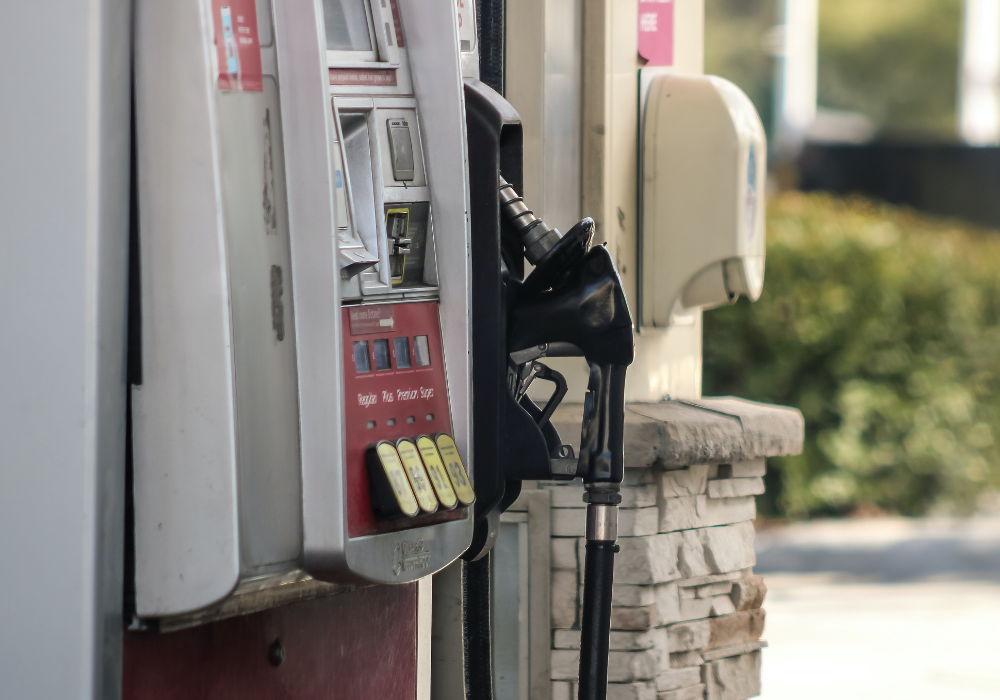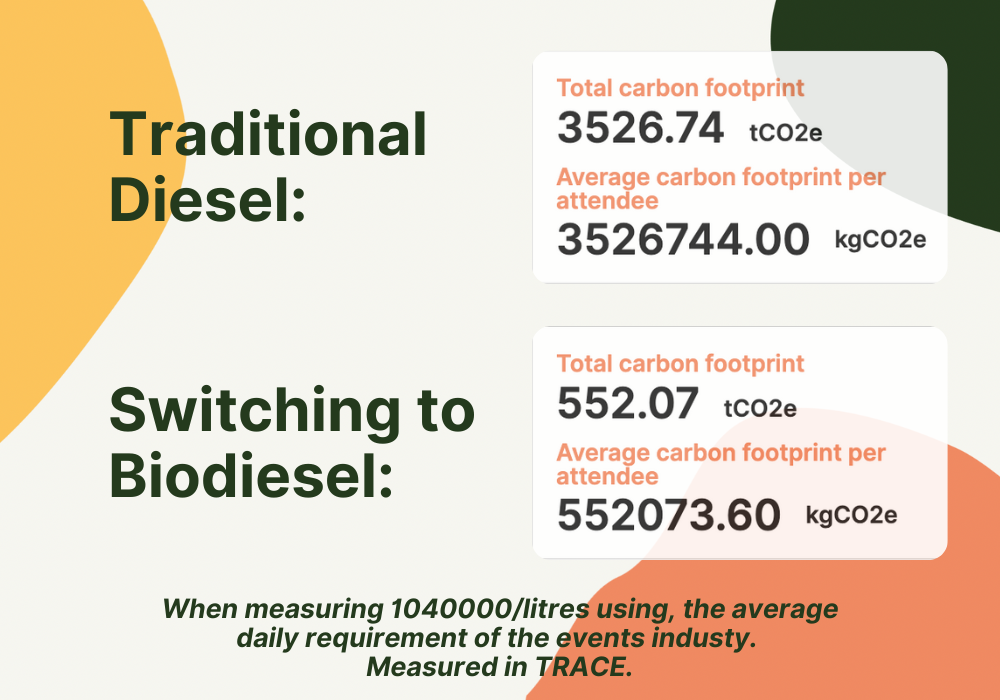Biodiesel (BD) or Diesel
Is Biodiesel a viable alternative to diesel for the events industry?

In the first of a new series, this or that, TRACE Customer Success Officer Emily Shephard explores the pros and cons of the decisions and switches we can make in the planning process of events. This month we look at biodiesel vs diesel.
Energy is one of the biggest and unavoidable impact areas for event emissions that organisers have little to no control over due to the responsibility often sitting with the venue. However, for events where generators are being used, we are presented with the unique opportunity to make a choice regarding the source of the fuel used. Giving the chance to take responsibility and choose a more sustainable option.
Biodiesel (BD) can be a viable alternative here to make significant reductions in our carbon footprint as well as having the potential to reduce the negative impact of diesel across other environmental areas, such as waste water and air and noise pollution.
What is it?
Biodiesel is a greenhouse gas-reducing, advanced biofuel that is an excellent alternative for diesel users, from driving a car to powering ride-on lawnmowers. It’s manufactured domestically from vegetable oils, animal fats, or recycled restaurant grease. Biodiesel is accessible across the UK from national suppliers and as pure biodiesel is able to be used in the majority of generators, no major technical upgrades are required to ensure compatibility. Just a change in your procurement procedures.
Emissions
The events industry uses 380 million litres of diesel a year, (UK Events and Diesel Use: Responding to a public health emergency) releasing 1.3million tonnes CO2e. if all of this was switched to a biodiesel alternative then there is a potential reduction of approximately 3000 tCO2e per day. This is the equivalent of keeping a 652 cars on the road for a year, for each day for the events industries diesel usage. You can test out different scenarios in TRACE to see the difference in your footprint if you were to make the switch for your next event.

Cost
Cost is always a driving factor when budgets are tight. Traditionally biodiesel has been the more expensive option but that gap is closing quickly as people search for alternatives to fossil fuels, a market which has become increasingly volatile, and the technology for alternatives advances. Wholesale prices for biodiesel have dropped from 187.99 pence per litre (ppl) in August 2022 to 75.97ppl in April 2023 with traditional diesel at 54.69ppl (RAC Foundation). A significant increase in affordability means that BD is now more economically viable, and should, theoretically, be easier to pitch to clients as part of the spend on a sustainable event.
Environment
Given that biodiesel is made from organic materials, the resulting fuel is, as the name would suggest, biodegradable. The biodegradability, how much something breaks down, of biodiesel is 98% after 28 days compared to 50% for diesel. Significantly reducing the long-term environmental impact of oil spills and leaks.
Beyond just looking at emissions as a measure of impact, biodiesel use can also lead to reduced particulate matter in the atmosphere, therefore helping to reduce levels of air pollution. This is due to the higher oxygen content of biodiesel. Higher levels of particulate matter are dangerous for health, with the two most important categories measured being PM10, where particles are less than 10 micrometres in diameter and PM2.5 where particles are less than 2.5 micrometres in diameter (National Statistics). Approximately half of the particulate matter in the atmosphere comes from human sources and so identifying ways to reduce the concentration, such as switching to biodiesel is an important piece of the puzzle in improving air quality.
Biodiesel production also leads to reduced wastewater with comparisons showing a five times reduction for the lifecycle analysis of biodiesel compared to diesel, the percentage of this wastewater also contains significantly lower hazardous material (U.S. Department of Agriculture and U.S. Department of Energy, 1998).
Noise
A strong correlation exists between the characteristics of particular fuels and the amount of engine noise and vibrations they emit (Tüccar, 2018). Biodiesel performs well in these areas, with lower scores compared with traditional diesel scores, leading to a quieter engine. A particularly useful consideration for quieter outdoor events and a chance to demonstrate that you’re thinking not only of the impact of the energy use but the clients’ experience too. Keeping noise levels in check, whether indoors or outdoors, is also key to maintaining positive relationships with the communities surrounding your event.
Should you make the switch?
The case for the switch to biodiesel is compelling, with environmental risk and emission reductions significant. Though widespread adoption will still take time, with not all venues being set up to make the changes to the suppliers that they use. And the wider issue of lacking the infrastructure to process the amount of organic material required to meet energy requirements. So whilst there are many benefits, the key to reducing your event’s energy emissions is to consider ways in which you can reduce the amount of energy you need, from updating equipment to improve efficiency to training the team to be vigilant in energy-saving measures. Reducing the amount of energy alongside considering the source of the energy will also make it much easier to make switches to more sustainable.
